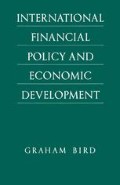Abstract
The argument that developing countries are a special case and warrant special treatment within the international financial system draws on a number of factors related both to equity and efficiency. On the equity side the argument is that people in developing countries have lower living standards than those in the rest of the world and that the international financial system could and should be used as a vehicle for directing a larger volume of aid to them. This immediately raises the whole question of the pros and cons of foreign aid. However, if it is decided that aid is to be encouraged, another question is whether the international financial system offers the best way of securing a desirable flow of aid. This is a matter of efficiency.
Access this chapter
Tax calculation will be finalised at checkout
Purchases are for personal use only
Preview
Unable to display preview. Download preview PDF.
Author information
Authors and Affiliations
Copyright information
© 1987 Graham Bird
About this chapter
Cite this chapter
Bird, G. (1987). The Developing World: a Special Case?. In: International Financial Policy and Economic Development. Palgrave Macmillan, London. https://doi.org/10.1007/978-1-349-08579-8_2
Download citation
DOI: https://doi.org/10.1007/978-1-349-08579-8_2
Publisher Name: Palgrave Macmillan, London
Print ISBN: 978-1-349-08581-1
Online ISBN: 978-1-349-08579-8
eBook Packages: Palgrave Economics & Finance CollectionEconomics and Finance (R0)

